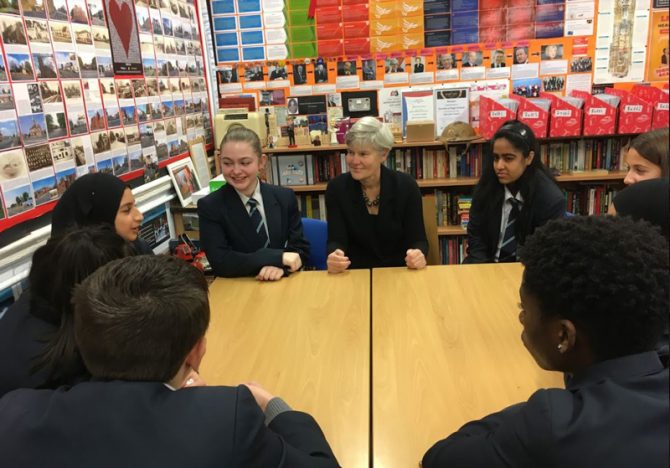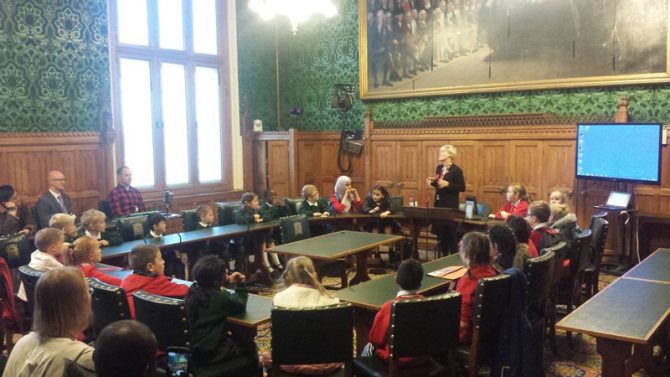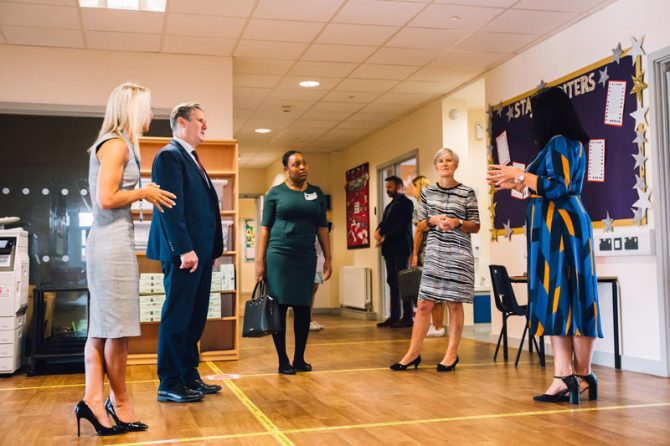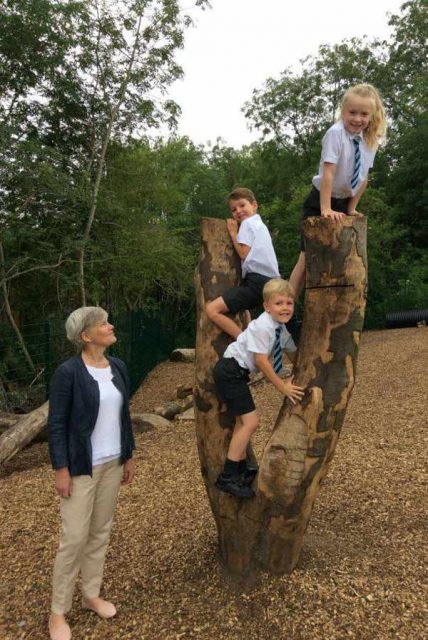Three months into the job of shadow education secretary, Kate Green reveals she is a ‘policy geek’ who is most naturally at home advocating for others…
In many ways, the boots Kate Green must fill as shadow education secretary are big ones. Both her immediate predecessors have powerful personal stories about social mobility that appealed to many. Angela Rayner, now deputy leader of the Labour Party, left school early, had a mum who couldn’t read or write, but earned a seat in parliament against the odds. Her successor, Rebecca Long-Bailey, worked in a pawn shop and furniture factory before she became a solicitor. Both are northern women who were relatively young when they took the shadow education brief – Rayner was just 36 years old – and with their large personal followings, were touted for bigger jobs.
You could see Edinburgh-born Green as their opposite. With parents who attended university, she doesn’t at first hand appear to have that compelling back story of triumphing against the odds that politicians seem to crave (alternatively, that voters crave in politicians). And, as a former chief executive of Child Poverty Action, she already has a chunk of her career behind her – which doesn’t support the rising star narrative.
But this may have big hidden advantages for the law graduate. A self-professed “policy geek” (much like shadow chancellor Anneliese Dodds, another native Scot), Green holds an opportunity to win over schools and colleges with a grasp of detail that neither of her predecessors were best known for (though to be fair to Long-Bailey, she didn’t have long to prove otherwise).

Green has worked with children and families for years – she’s a former director of the National Council for One Parent Families – so the role is lunlikely to just be another stepping stone of her political career. Were Labour to win the election, Green’s character may set her up well to bed down and tackle the nitty gritty policy issues others have ignored.
But that’s potentially a long way off, and some problems are more immediate. At the end of last month, Green herself was in hot water when she said the Covid-19 pandemic was a “good crisis” which Labour shouldn’t let “go to waste”, leading to Boris Johnson claiming her words revealed “the real approach of the Labour Party”. Green is total in her self-condemnation.
“You know, if you want to be a politician operating at this level, it’s incumbent on you to do it really, really well. And on that day I slipped up, I made a mistake, and there is no room for mistakes at this level, there just isn’t. Of course, everyone is human, but you have to do this job really, really well.”

But she seems to keep that human side slightly more hidden. Green skirts over her home life beyond childhood, and can’t lay hands on childhood photographs. In that regard, she probably reflects her Scottish upbringing, one in which hard work and privacy were the norm (“I had no idea how my parents voted,” says Green). Her parents were from poorer backgrounds in west Scotland and had managed to become teachers, so education was seen as crucial. But a streak of rebellion grew in Green during that time, too.
One incident she remembers was her father in conversation with a friend who was leaving his primary school headship for a teacher training college post. “The friend asked, ‘will your deputy [whom Green describes as an “amazing, formidable woman”] get your job when you leave?’ And my dad said, ‘Oh, they’d never give a school this big to a woman.’ I was sitting there thinking, ‘You have spent my entire life telling me I can be anything I want, and I’ve just heard you say to somebody else that actually I can’t’.” Green never told her father the impression the moment made on her, but says it and the lack of opportunity for women has stuck with her for decades. “I guess I’ve spent a lot of my career kicking back against that.”

First off, she left Scotland and arrived during the 1981 recession in London, where she would do 15 years at Barclays. Her assessment is concise. “Banking wasn’t it, I didn’t enjoy it, and I wasn’t any good at it.” Why do it? Her parents recalled their own parents being jobless, including her grandfather who would pick up work on the docks. Job security “was burned into my psyche”. Green now worries that in the upcoming recession, like her, young people could spend years just trying to find work they enjoy.
But a future direction began to form as the young Green reacted to homelessness in the capital under the Thatcher government by attending Labour Party meetings, which she “found a bit depressing”. But she persevered and eventually another party member, a teacher, suggested she stand for parliament. “I said, ‘Don’t be ridiculous, people like me don’t do something like that.’ But the idea stuck.” She stood for parliament in Tony Blair’s landslide 1997 election for the Cities of London and Westminster, a Conservative stronghold, and lost. That experience, however, “changed everything” and she left banking. “I went to work in the Home Office for a couple of years. I learnt more in those two years in the Home Office about how the country is really run than I had ever understood before.” Her main policy interest at this point was criminal justice, since her degree was in law and she’d been a magistrate.
Green then left the civil service to stand and lose an election again, this time for the Greater London Assembly in 2000. “By this time I’m 40 and I’m thinking, ‘Look, what are you going to do with your life now, you can’t spend the next ten years going around losing elections, get a grip’.” What did her parents think of this career move? “They hadn’t particularly wanted me to stand for election, they were nervous.” But when Green was elected in 2010 from an all-women shortlist to Stretford and Urmston in Greater Manchester, they were excited. The level of privacy at home is evident when she adds with a wide smile, “My mum came out to me as a Labour Party voter!”
The delay to becoming an MP may have been fortuitous. By 2010, Green had racked up significant experience in two top social policy roles. Labour leader Keir Starmer has pointed to her role as former chief executive of Child Poverty Action (during the years when New Labour pulled almost one million children out of poverty) but less has been made of the job Green says was her “happiest”. As director of the National Council for One Parent Families, she got to support some of the most undervalued women in society. Clearly Green is highly irritated by people stereotyping vulnerable groups without checking their facts first. “Teenage single mums had been demonised… but this is the parent that stayed, not the parent that walked away. They are desperate to be role models for their kids.” The same motivation was behind her support for Roma, gypsy and traveller children (she chaired the all-party parliamentary group). She recalls being elected when Eric Pickles was secretary of state for communities. “He was announcing a cut in funding for traveller sites, and at the same time wanted to tighten up planning laws. And I thought that’s stupid policy, and I don’t like stupid policy, so I got annoyed.” She started “asking questions” and has been trying to tackle prejudice against the community since.

The most telling line here is “I don’t like stupid policy.” It’s also why, when I press Green for details of her policy plans on various issues – scrapping Ofsted, the ‘outstanding’ judgment, SATs, workload, recruitment – she takes on a cautious and pragmatic tone, saying that most will be “reviewed”. Labour clearly needs someone who can present policy-tight answers to big visions lacking clear plans like its proposed “National Education Service”. But as a geek officially annoyed by stupid policy, she won’t be drawn before she’s done the research. “I’m in listening mode.”
But she does say one of her big focuses is “inclusion”. Unequal outcomes for pupils with special educational needs, black and ethnic minorities, traveller children “are just unforgivable. We should not leave any child behind.” She also reacts strongly to my suggestion that certain proposals – like scrapping Ofsted – could be criticised by parents as leading to lower standards. “I’m absolutely not interested in lowering standards. We want to have no compromise on standards.”
In a sense, Green is a shadow education secretary who is most naturally at home with being an advocate for the vulnerable. Her challenge will now be to combine that with detailed policy plans that have been somewhat lacking among the Labour party in recent years.














Your thoughts